News
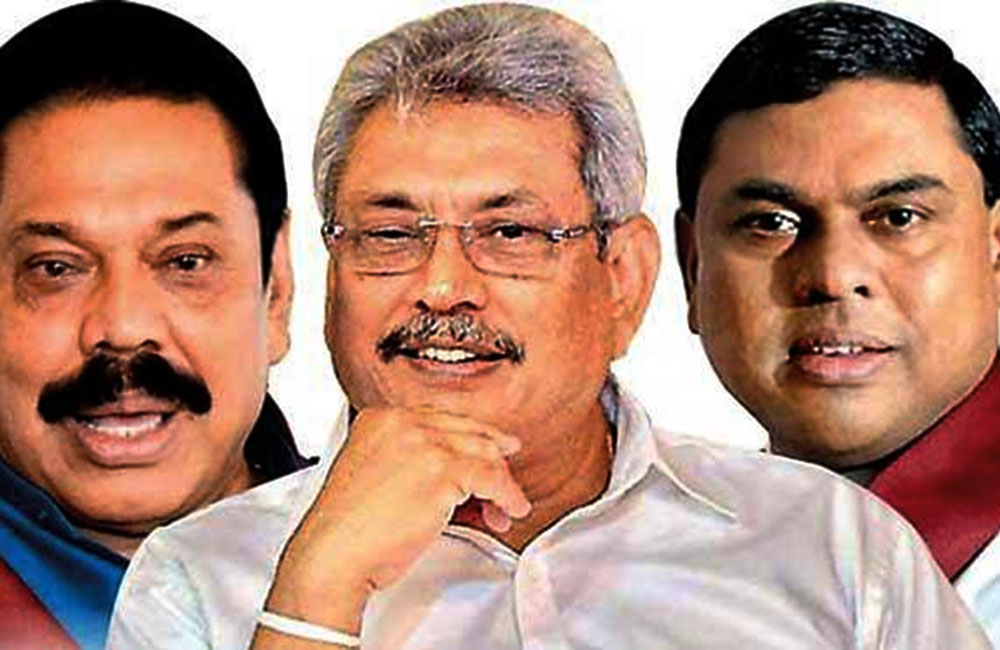
Mahinda, Gota, Basil and others responsible for mishandling economic crisis – SC
The Supreme Court today held that several respondents including former President Gotabaya Rajapaksa, former Prime Minister Mahinda Rajapaksa, former Finance Minister Basil Rajapaksa and former Central Bank of Sri Lanka (CBSL) Governor Ajith Nivard Cabraal are responsible for mishandling economic crisis in the country.
Accordingly, in a majority decision a Supreme Court five-judge-bench ruled that respondents including former President Gotabaya Rajapaksa, former Prime Minister Mahinda Rajapaksa, former Finance Minister Basil Rajapaksa, the Monetary Board, former CBSL Governor Ajith Nivard Cabraal, former CBSL Governor W.D. Lakshman, former Treasury Secretary S.R. Artigala and former President's Secretaries P.B. Jayasundara and Saman Kumarasinghe have violated public trust.
The Supreme Court further held that the respondents have breached the fundamental rights to equal protection of the law in terms of Article 12(1) of the Constitution.
Chief Justice Jayantha Jayasuriya observed that it would not be appropriate to issue an order that the respondents pay compensation to the petitioners since they have not claimed so in their petitions.
Therefore, the Supreme Court did not issue an order for compensation. However, the Supreme Court ordered that each petitioner would be entitled to a legal cost of Rs. 150,000 by the respondents.
(dailymirror.lk)

Registration renewal of mobile phone SIM cards
A registration renewal of mobile phone SIM cards will take place island wide, said the Telecomunications Regulatory Authority.
It will be mandatory for users to register the SIMs they use under their own name.
They should also be aware of the SIMs issued to their national identity card number, it said.
Details on that could be obtained by dialing #132#.
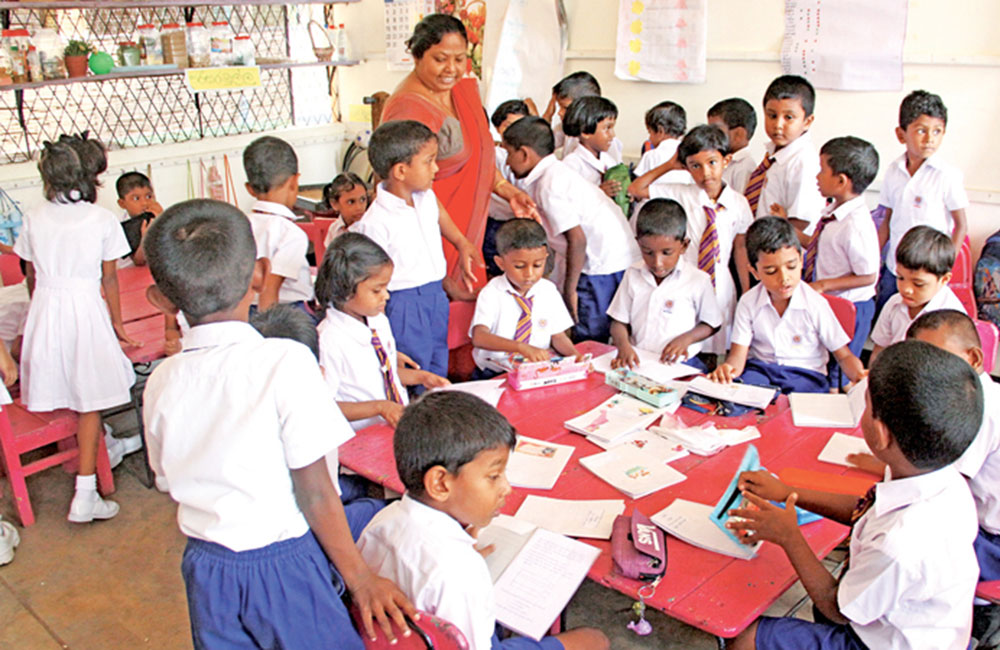
Parents of schoolchildren warned of financial scam
A financial scam targeting parents of schoolchildren has been reported from several parts of Sri Lanka.
According to Daily News, the Sri Lanka Police has launched an investigation into the scam following complaints of several incidents.
It is reported that the gang posing as school authorities has been contacting parents claiming that their child is severely ill and in need of treatment for which they are required to immediately deposit cash.
The father of a child from a reputed school in Colombo had received a similar call, but as a lawyer, he had verified with the school authorities after which it was found to be a scam.
An individual working in a bank in Kurunegala received a similar phone call and rushed to the hospital, but was prevented from depositing the money after his colleague had verified with the school authorities and identified the scam.
The father of a student studying in another leading boys’ school in Kurunegala had also received a similar call but had sent the child’s grandfather to the school where the authorities had assured the child was well and in class, revealing the scam.
Investigations have found that some parents had deposited money to the scammers due to failing to verify the safety of their children.
Meanwhile, it was found that the scammers had broken into and robbed the houses of parents who had rushed to the hospitals after being deceived by the scammers.
The Police have requested the public not to fall victim to such scams and to verify the details before acting on the false information.
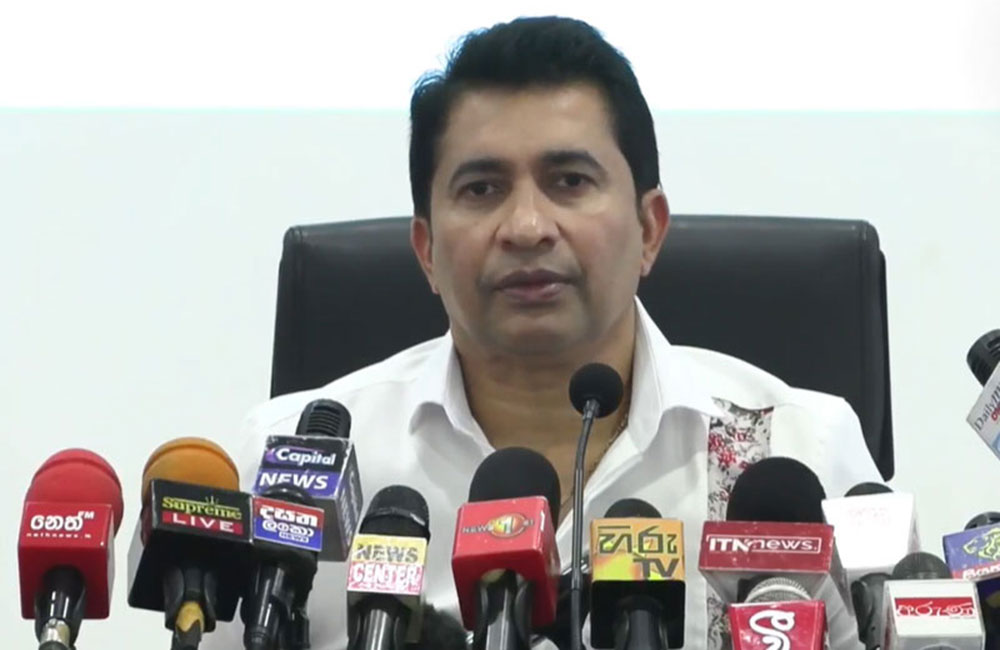
Claiming a conspiracy, Roshan Ranasinghe plans to go before int’l court
Sports Minister Roshan Ranasinghe has questioned the recent ban imposed by the International Cricket Council (ICC) against Sri Lanka Cricket (SLC), and assured that Sri Lanka would appeal to the global cricket governing body in this regard.
Speaking at a special press conference held this afternoon (10 Nov.) at the Sports Ministry in Colombo, Ranasinghe stated that the ban comes as a shock, given its sudden implementation by the ICC.
The Minister explained that the ban was imposed without any prior notice or warning, and is thereby inconsistent with the required ICC procedures usually followed in such matters.
“It is not ethical, it is a surprise”, Ranasinghe said, explaining that as per the ICC’s arbitration rules, prior to suspending a country’s membership from the ICC, the global cricket body is required to notify the relevant member country of their shortcomings at an Annual General Meeting (AGM), following which the relevant country’s membership may be suspended one year from the date of initial notice, in the event the concerns they were notified of remain unaddressed.
“How can they condemn our country like this? They condemned our country without informing us”, the Minister asserted, explaining that Sri Lanka is not the only ICC member with interim committees and alleged state influence in cricket.
Speaking further in this regard, Ranasinghe raised questions about countries such as Pakistan and Afghanistan; the former where there exists a plethora of interim committees related to cricket, and the latter where, albeit ICC law stating that there be a women’s cricket team, the Taliban law does not allow for such an establishment.”That is also state involvement”, the Minister said, questioning the rationale behind Sri Lanka’s ban.
Thus, the Minister explained that measures are currently underway to first question the ICC on the grounds and shortcomings on which Sri Lanka’s membership was banned. However, if these measures fail, the Minister asserted that Sri Lanka would appeal to the ICC in this regard.
On Friday night (10 Nov.), the ICC suspended SLC’s membership, with immediate effect, saying that the national cricket governing body is in serious breach of its obligations as a Member, in particular, the requirement to manage its affairs autonomously and ensure that there is no government interference.
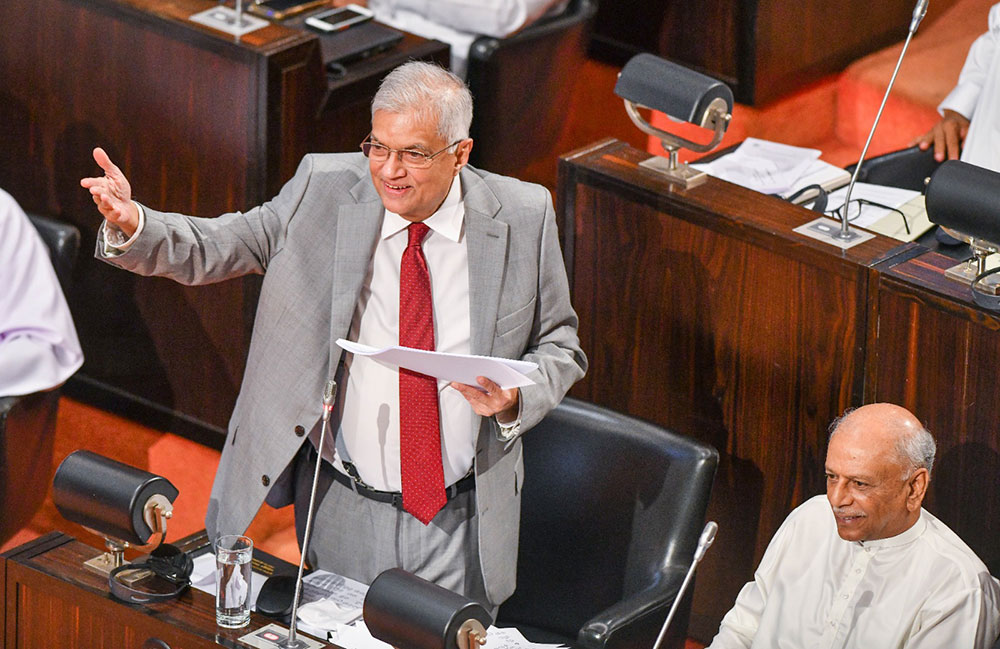
06 highlights from budget 2024
The following are 06 highlights from the proposals contained in budget 2024 presented to the House by president Ranil Wickremesinghe today (13).
1)A Rs. 10,000 increase in cost of living allowance for 1.3 million state sector workers from January 2024, to raise it to Rs. 17,800.
It will begin to be paid from April with the payment of arrears within six months from October.
For pensioners, the CoL allowance will be increased by Rs. 2,500 to Rs. 6,025.
2)The between six to seven per cent pension contribution from the basic salary will be increased to eight pc from April.
3)The now–restricted contingency loan will be paid as per normal from January.
4)The Rs. 60 billion annual allocation for Asvesuma to be raised by Rs. 183 billion and an increase in the beneficiary families to two million.
Increases in monthly allowances to persons with disabilities and kidney patients (to Rs. 7,500) and senior citizens (to Rs. 3,000).
5)The Rs. 3,000 monthly rent for low-income families under urban housing will be scrapped and ownership given to an estimated 50,000 families in 2024.
Rs. four billion to be allotted to grant land for the construction of houses for estate dwellers.
6)Another Rs. 1,000 million to be given to pay compensation for persons living in northern and eastern provinces affected or gone missing due to the internal conflict.
The 2024 budget proposal also outlines numerous essential initiatives aimed at enhancing tax administration and revising tax policies. Some key proposals are detailed below:
• Amendments to the Inland Revenue Act No. 24 of 2017, including the introduction of special penal provisions for individuals failing to provide requested tax returns and information.
• Implementation of stringent measures for tax audit documentation, with a time limit of 6 months for evidence within Sri Lanka and 9 months for other evidence from the date of the initial request. Failure to comply during the appeal hearing at the Tax Appeals Commission will result in disallowed submissions.
• Mandatory submission of a copy of the Tax Payer Identification Number certificate in various scenarios, such as opening a current bank account, seeking building plan approval, registering or renewing a motor vehicle license and recording or settling land or land titles.
• Introduction of a tax administration system for the Sri Lanka Excise Department, encompassing the implementation of an online licensing system for a more consumer-friendly and efficient regulatory environment, evaluation of safety features and the introduction of a new Excise Permit System.
• Policy proposals for the Sri Lanka Excise Department in the budget include the establishment of Sri Lanka Standardization for maintaining liquor quality, adjusting excise license fees based on current demand, promoting investment in new alcohol products for foreign markets, permitting the sale of selected locally produced liquor in duty-free shops and implementing the Revenue Administration System for Excise Department (RASED) by October 2024.
• For the Sri Lanka Customs Department, the budget proposes the development of risk management capabilities using modern software, the installation of a system to prevent incorrect invoicing and the identification of Key Performance Indicators (KPI) related to basic administrative functions.

ICC suspends Sri Lanka Cricket’s membership
The International Cricket Council (ICC) Board has suspended Sri Lanka Cricket’s membership of the ICC with immediate effect.
The ICC Board met today (10 Nov.) and determined that Sri Lanka Cricket is in serious breach of its obligations as a Member, in particular, the requirement to manage its affairs autonomously and ensure that there is no government interference in the governance, regulation and/or administration of cricket in Sri Lanka.
The conditions of the suspension will be decided by the ICC Board in due course.
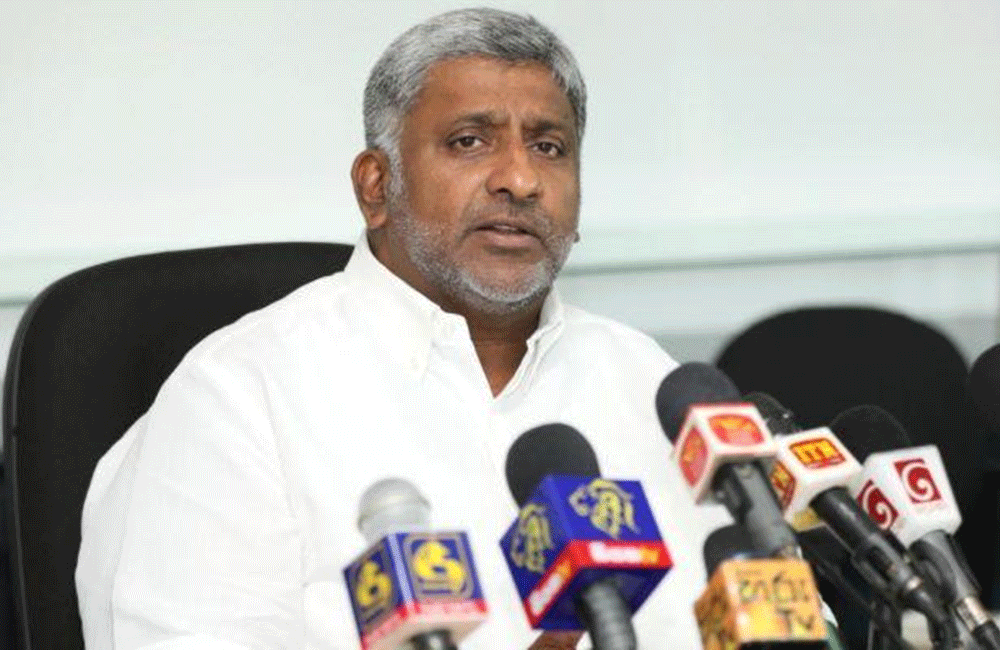
All efforts will be taken to get cricket ban lifted – Prasanna
All efforts will be taken, both in and outside parliament, to get the international cricket ban on Sri Lanka lifted, said chief government whip Prasanna Ranatunga.
The Wickremesinghe-led government will negotiate with the ICC in that regard, he said.
Every citizen accepts Sri Lanka Cricket to be a worst corruption institution, he said.
It was not a political meddling that all in parliament joined together and adopted a resolution to eliminate corruption from the SLC, added Ranatunga.
He urged the sports minister to take immediate legal action against SLC president Shammi Silva for having asked the ICC to suspend SLC, as reported by espncricinfo.com and other international media.
ICC meets on 21st
Since announcing its suspension of SLC, the ICC is yet to reveal the conditions attached.
It is due to meet on 21 November to discuss the next course of action.
Silva has told the media that he too, would participate, before which he would meet president Wickremesinghe.
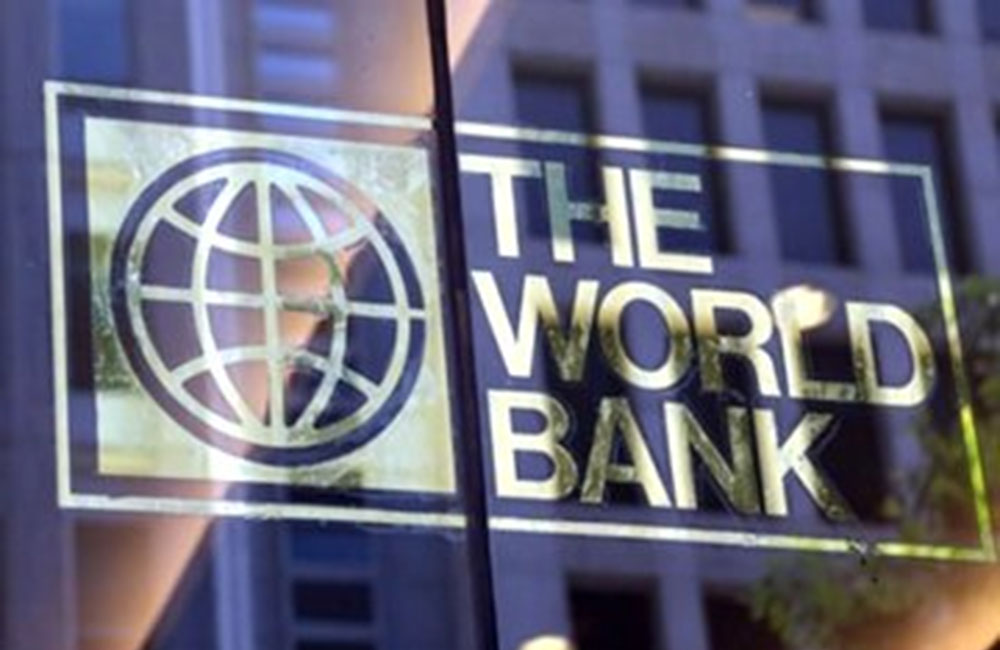
WB approves $150 mn to strengthen Sri Lanka’s financial sector safety net
The World Bank Executive Board on Thursday (Nov 09) approved US$ 150 Million in financing for Sri Lanka to strengthen the resilience of the financial sector.
Issuing a statement, the World Bank said the fund is provided to strengthen the financial and institutional capacity of Sri Lanka’s financial sector safety net, with a focus on the Sri Lanka Deposit Insurance Scheme.
“Sri Lanka’s economic crisis highlights the need for strong safety nets to support the financial sector. A stable and reliable banking sector is essential for the economy, businesses and individuals, small businesses and poor households,” said Faris Hadad-Zervos, World Bank Country Director for Maldives, Nepal, and Sri Lanka. “Strengthening the Deposit Insurance Scheme will help protect the savings of smaller depositors, including women and people living in rural areas. It will also sustain the confidence in Sri Lanka’s financial system, a critical part of building the country back better.”
The Financial Sector Safety Net Project is designed to boost the financial and institutional capacity of the Sri Lanka Deposit Insurance Scheme (SLDIS), which is managed by the Central Bank of Sri Lanka.
The financing will help boost reserves of SLDIS which could be used towards the payout to insured depositors of banks and licensed finance companies. In parallel, the project will support institutional strengthening of the SLDIS in line with international good practices for effective deposit insurance schemes.
“Strengthening the financial sector safety net is crucial for maintaining financial stability during a macro-debt crisis,” said Alexander Pankov, Lead Financial Sector Specialist and the Task Team Leader for the project. “A robust deposit insurance system, along with enhanced supervision and resolution frameworks, will safeguard public confidence in the financial system and protect people’s savings.”
The SLDIS was established in 2010 and has conducted several payouts for failed licensed finance companies in recent years. Currently, the SLDIS guarantees the deposits of households and enterprises up to LKR 1,100,000, which covers more than 90 per cent of deposit accounts in Sri Lanka.
The legal framework for deposit insurance in Sri Lanka was upgraded earlier this year through the approval by Parliament of the Banking Special Provisions Act. SLDIS should now be strengthened institutionally and financially for it to be able to effectively fulfil its legal mandate of protecting the financial sector stability.
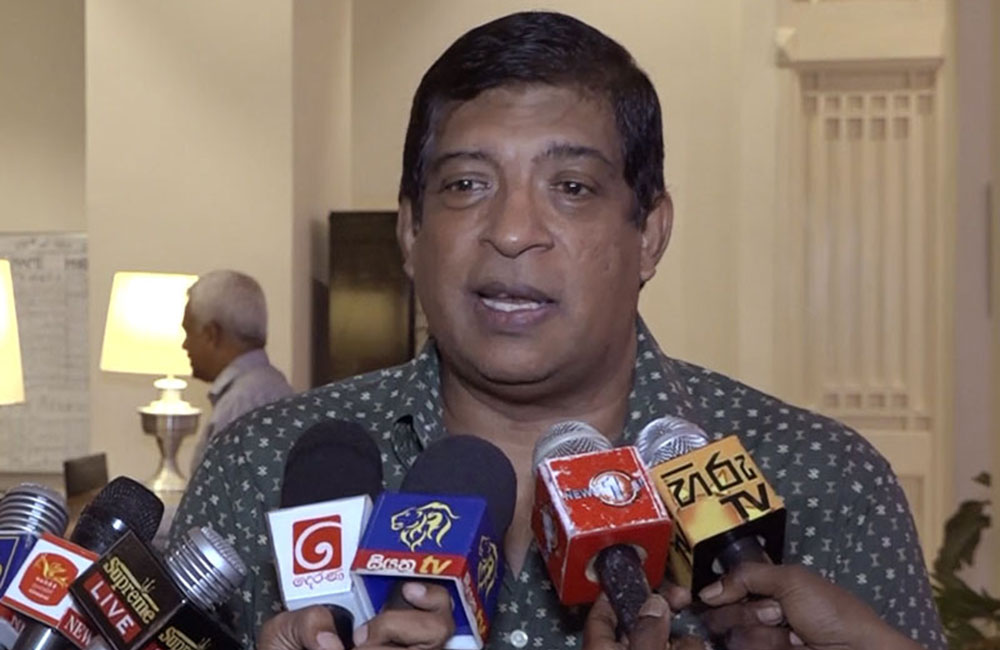
Cohesive programme needed to revive cricket – Ravi K.
Former finance minister Ravi Karunanayake has called for a cohesive programme to revive the game of cricket in Sri Lanka with the support of its veterans.
He was speaking at a cricket carnival that is presently underway in front of Grand Oriental Hotel, where all matches of the World Cup 2023 are being shown on wide screen.
Karunanayake said all wished for the resolution of the issue of cricket, loved by all, by eliminating corruption and irregularities and giving opportunities for experienced players without undue interferences.
A programme should be implemented to bring out the inborn talents of our cricketers, while immediately removing and punishing those responsible for irregularities, he said.
Not just in cricket, but all other fields should be cleansed of fraud and corruption, he added.
Collective responsibility to strengthen economy
Karunanayake also responded to questioned raised by journalists with regard to the economy.
The collapsed economy has been given a reawakening, he said, adding that president Ranil Wickremesinghe has been able, with much difficulty, to bring the country out of its dark period to some extent.
The president will give leadership via the budget to help it come out of difficulties, and it is the responsibility of all to support him collectively, he said.
The best thing to do at this moment is to curtail expenses and earn more income creatively, with focus on strengthening the export economy, said the former finance minister.
Although we were forced to go to the IMF for support, we should not agree to everything it says.
Work untiringly and strengthen the economy via a method of our own, he said adding that 90 per cent has to suffer for the wrongdoings committed by a mere 10 per cent.
Certain state officials have misled the country
There is talent among state officials, but 15 to 20 per cent among them have misled the country, he charged.
It was wrong to level the finger at only politicians, who number 9,000 at most, while there are as many as 1.7 million state sector officials through whom everything should be done.
At least now, that should be changed after 71 years of finger-pointing, he stressed.
Next year will see two to three elections taking place, Karunanayake added.
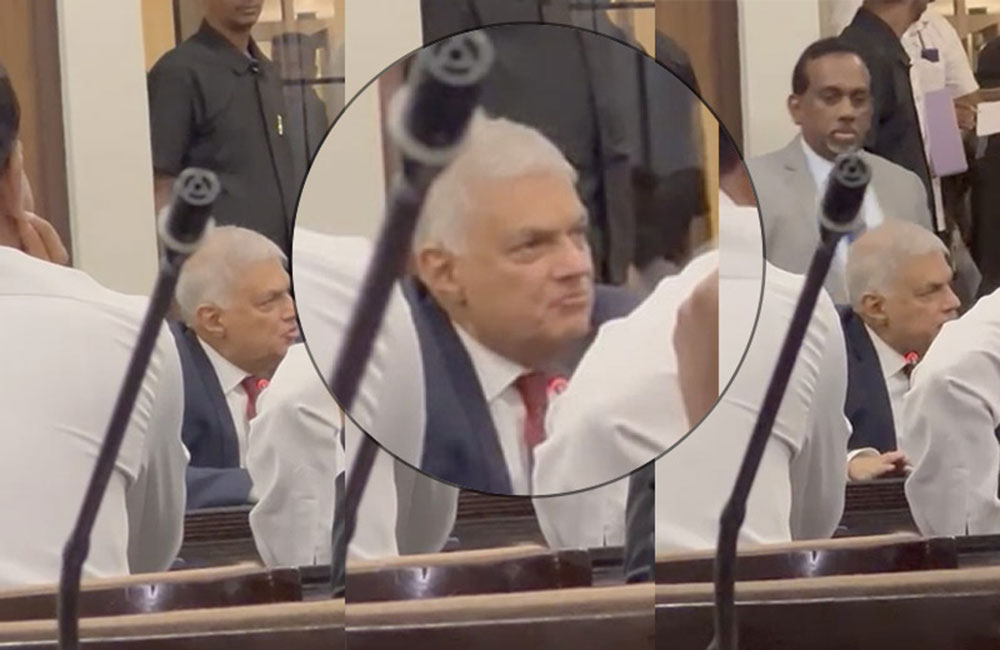
President's take on the Sri Lanka Cricket crisis
Stressing that they shouldn't pursue band-aid solutions to resolve the Sri Lanka Cricket crisis, President Ranil Wickremesinghe said the only solution is to implement the report submitted by the Committee headed by Justice K.T. Chitrasiri to introduce a new constitution to Sri Lanka Cricket through a parliamentary act.
Recalling his contribution to the development of school cricket during his tenure as the Minister of Education when president J.R. Jayawardene and former minister Gamini Dissanayake initiated projects to develop the game in the country, President Wickremesinghe observed that his efforts to develop cricket at the school level played a pivotal role in Sri Lanka's world cup victory in 1996.
When asked whose side the president is on, he quipped; "I am not on either side. I am on the side of cricket".
He revealed that the International Cricket Council had discussed the Sri Lanka cricket crisis yesterday, adding that he fears it may lead to a negative outcome.
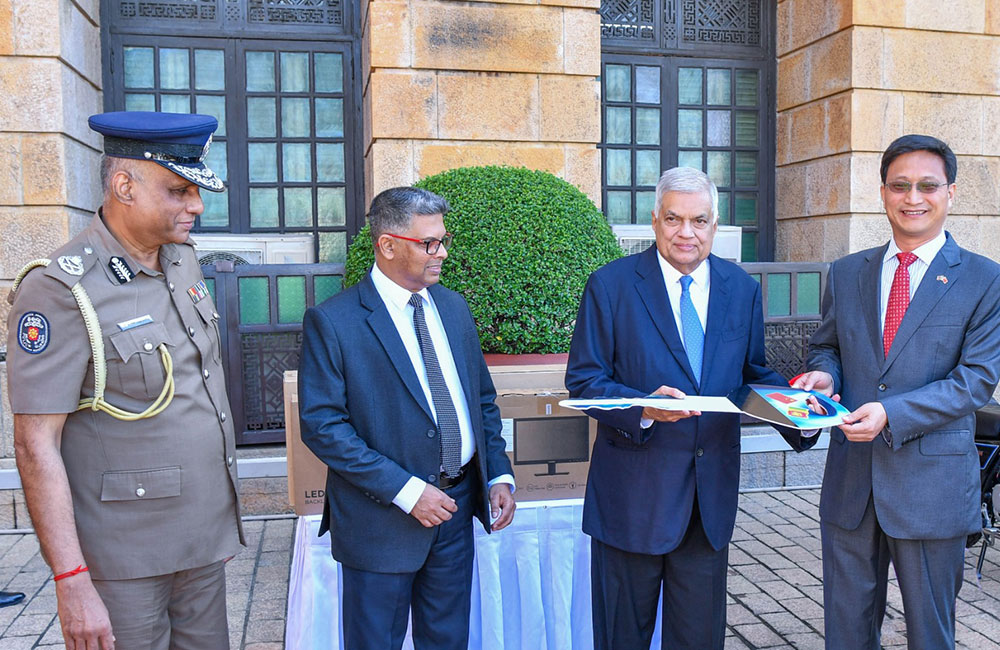
China donates motorcycles & computers for SL Police
The People’s Republic of China officially handed over 26 RANOMOTO motorcycles and 100 LENOVO desktop computers to the Sri Lanka Police Department in a ceremony at the Presidential Secretariat yesterday (10).
Based on a request made by IGP C.D. Wickramaratne Mr. Sagala Ratnayake, the President’s Senior Adviser on National Security and the President’s Chief of Staff had coordinated with the Ambassador to China, Mr. Qi Zhenhong, aimed at enhancing the operational capabilities of the Sri Lanka Police Department.
The official handover of related documents took place as Mr. Mr. Qi Zhenhong the Chinese Ambassador of China to Sri Lanka presented the goods to President Ranil Wickremesinghe.
The ceremony was attended by a group of senior officials from the Chinese Embassy, Inspector General of Police C.D. Wickramaratne, Senior Deputy Inspector General of Police (Administration) Nilantha Jayawardena and other high-ranking officers from the Police Department.(PMD)
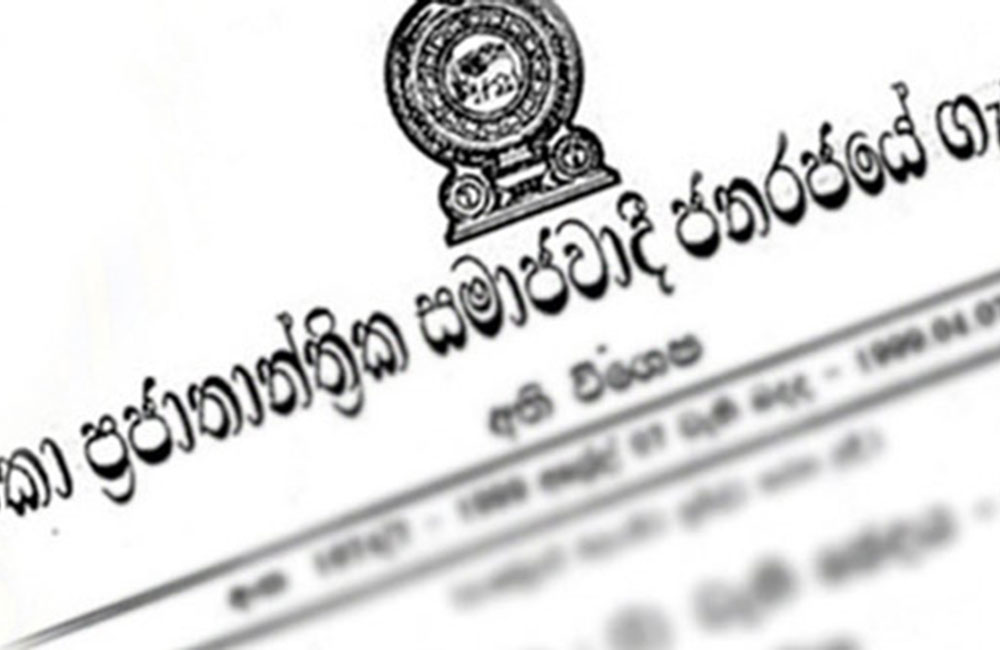
Gazette issued declaring postal service as essential
President Ranil Wickremesinghe has issued an Extraordinary Gazette notification this evening (Nov. 08) declaring the postal service as an essential public service.
The Gazette has been issued by virtue of the powers vested in the President in terms of Section 2 of the Essential Public Services Act, No. 61 of 1979.
Accordingly, the postal service has been declared to be an essential public service considering it necessary that the services provided by any Public Corporation or Government Department or Local Authority or Co-operative Society or any branch thereof being a Department or Corporation or Local Authority or Cooperative Society, which is engaged in the provision of the postal service, is essential to the life of the community and is likely to be impeded or interrupted, the gazette states.
Page 214 of 658